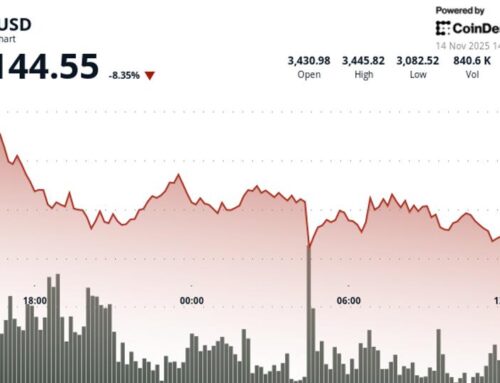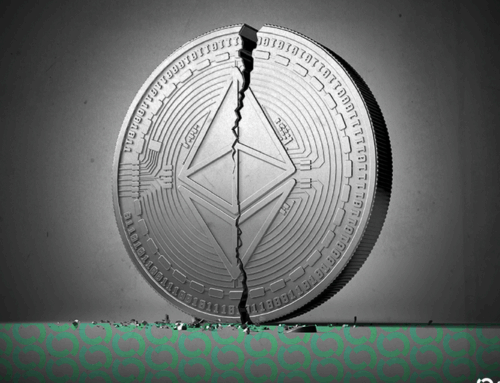Warren Buffett’s big bash and Anthony Scaramucci’s crypto meetup had some common themes
November 14, 2025
Getty Images; Patrick T. Fallon / AFP
- Warren Buffett’s shareholder weekend and Anthony Scaramucci’s SALT conference were different worlds.
- The Berkshire Hathaway CEO has bashed bitcoin, while crypto is core to SkyBridge’s SALT meetups.
- But Buffett and the crypto crowd share some common goals, such as removing friction and barriers.
Warren Buffett‘s shareholder weekend in Omaha this May, and Anthony “The Mooch” Scaramucci‘s crypto-heavy SALT conference in London last week, might seem like two different worlds — but they had more in common than you’d think.
The famed investor and Berkshire Hathaway CEO welcomes tens of thousands of his shareholders to his hometown each year, hosting them in a vast arena with scores of concession stands and heaps of bargain merchandise.
By contrast, the hedge fund manager’s SkyBridge Alternatives Conference was held in a grand Mayfair hotel, where guests were plied with endless hors d’oeuvres served by a platoon of waiters in crisp white shirts and black vests.
The difference was striking but unsurprising. Buffett’s “Woodstock for Capitalists” is open to anyone who owns even a single Class B share, priced under $500. A ticket to SALT costs around $5,000, attracting a stylish, well-heeled crowd of financial professionals. Business Insider received media access to both events.
Philosophical differences
The two gatherings centered on opposing investment creeds.
Buffett, 95, has long dismissed bitcoin and other tokens as worthless and dangerous — tools for criminals and predators that will come to a “bad ending.”
The legendary stock picker has said that unlike businesses that provide goods and services and generate profits and cash flows, bitcoin doesn’t produce anything and only rises in value when new buyers are roped in, similar to a Ponzi scheme.
The so-called Oracle of Omaha — who will step down as Berkshire’s CEO next month but remain its chairman — preaches long-term, conservative investing built on values such as frugality, simplicity, honesty, patience, discipline, and prudence. For years, his annual meeting has centered on a six-hour Q&A where he dispenses plainspoken wisdom and urges faith in the “American miracle.”
SALT, meanwhile, caters to an industry crowd versed in acronyms such as DATs (Digital Asset Treasurys), DACs (Decentralized Autonomous Corporations), DLT (Distributed Ledger Technology), TradFi (traditional finance), and on-chain (on a blockchain).
Speakers at the London conference championed crypto as protection against the debasement of fiat currencies, profligate governments, and overzealous regulators. They touted systems that eliminate the need for trust through smart contracts and digital trails.
Some panelists expressed humility, admitting the industry has been overeager to digitize everything, has lacked killer applications, and has struggled to be taken seriously when lottery-style memecoins are all the rage. They called for greater understanding of many investors’ need for authority, credibility, and comfort — not the Wild West.
A Buffett acolyte in the room might have felt like a dinosaur, left behind by a vision of the future that reimagines the financial system and money itself.
Yet they might have found common ground with the crypto crowd in shared aims: cutting out intermediaries and bureaucracy, widening market access, making processes faster and cheaper, and learning from mistakes— all tenets that Buffett has long espoused.
John Kikko, 44, director of business development for financial markets at the Hedera Foundation, told Business Insider that “rotten apples” such as FTX and Celsius “put a stain” on crypto and caused a “loss of trust.” He said scandals like those showed how speculation can tip over into “overleverage and cutting corners and just sloppiness on risk management.”
However, clearer regulation and rising institutional adoption are making crypto mainstream, with an increasing number of countries embracing it as a growth industry that can attract talent and capital, Kikko said.
He described the history of crypto to date as a “grand experimentation” with a new technology. He compared it to Las Vegas, as the desert city was originally built on speculation and gambling, but attracted other industries such as hotels, restaurants, and events as it matured into a global destination.
Kikko said that in the years ahead, crypto could help counter potential job losses from AI by spurring creativity and entrepreneurship, allowing people anywhere — without formal qualifications — to build and fund projects without gatekeepers.
One of Hedera’s key goals is to democratize access to financial products, Kikko said. He added that these “unlocks” include: using tokens to allow people to trade fractions of US stocks at any time from anywhere in the world; enabling investing in illiquid assets such as real estate, private credit, and private equity so anyone can cash in on a company like OpenAI or SpaceX even if it’s not public; broadening access to stablecoins in countries with hyperinflation or volatile currencies so locals can safeguard their wealth; and powering fast and cheap cross-border remittances.
Investing reimagined
David Johnston, 40, a veteran crypto investor and developer who runs a family office named Yeoman’s Capital, told Business Insider about a crypto project named Morpheus.
He described it as a “private ChatGPT” for the token’s holders, that doesn’t mine their inputs or insert advertising into its responses. He compared it to Alphabet’s open-source Android operating system, saying it’s designed to make AI cheap and universal as Android has done with smartphones.
“I love honest money and bitcoin is great, but I also want freedom of intelligence — to think and ask and prompt what I want,” he said.
Johnston drew a parallel between value investing and crypto, saying that “most of the early bitcoiners” were Buffett-style investors. “They just see bitcoin as the real hard money that’s backed by power and electricity and computers,” he said. “Those are the fundamentals.”
Another attendee with a family office, who requested anonymity, said he’d previously worked in the US mortgage industry. He said that he embraced crypto because he was frustrated by all the red tape and friction, and liked that it offered more transparency and control, plus protection from a weakening dollar.
Other conference guests were less philosophical in interviews, saying they began trading crypto because it was easier to make money than in crowded, conventional markets, or they treated it like a numbers game — buying a bunch of coins in the hope one “goes to the moon.”
Based on his past comments, Buffett would likely be skeptical of the crypto crowd’s claims, and probably will never become a bitcoiner. But even he might see value in crypto if it delivers on its promises of a simpler, fairer, and wealthier world.
Search
RECENT PRESS RELEASES
Related Post



